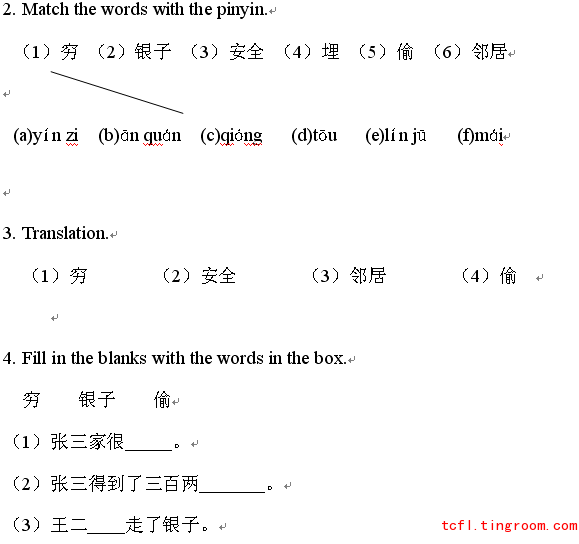这里没有银子
长 路/文
毅 忠/译
No Silver Buried Here
、
1、张三家里很穷,从来没有银子。
Zhang San was very poor. He had never got any silver in his home.
2、有一天,他得到了三百两银子,想把它们放在一个安全的地方。
One day, he got 300 taels of silver and decided to put it in a safe place.
3、晚上,张三把银子埋在了地里,还在上面插了一个木牌,上面写着:这里没有银子。
Overnight, Zhang buried his silver in the ground and put up a note, saying: "No Silver Buried Here."
4、第二天,邻居王二看到木牌,知道下面一定有银子,于是把银子偷走了。
The next day, his neighbor, Wang-Er saw the note. He thought that there must be silver here. Then he stole it.
5、王二担心被人发现,也在那个地方插了一个木牌,上面写着:王二没有偷银子。
Not wanting others to suspect him, Wang-Er put another sign there that said: "Your Neighbor Wang-Er Did Not Steal Them."
New Words
①穷:poor ②银子:silver ③两:tael ④安全:safe ⑤埋:bury ⑥邻居:neighbor ⑦偷:steal
Language Tips
中国有一个成语"此地无银三百两"就是出自这个故事。"此"是这个的意思;"地"指地方;"无"是没有;"银"是银子。比喻本想掩盖事实,但手段笨拙,反而使事情彻底暴露。
The Chinese idiom, "此地无银三百两"(No 300 Taels of Silver Buried Here), comes from this story. Here"此"means "this","地"refer to the "place", "无"means "no" and "银"is the "silver". This idiom means that a clumsy denial only results in self-exposure, a metaphor for one's overkilling to worsen a situation rather than bettering it.
Practice
1.True or false.
( ) ⑴ 张三家很穷。
( ) ⑵ 张三得到了二百两银子。
( ) ⑶ 张三把银子埋在了地里。
( ) ⑷ 王二在木牌上写着:这里没有钱。
( )(5)王二偷走了银子。
( )(6)王二在木牌上写着:王二没有偷银子。
 English
English Japanese
Japanese Korean
Korean French
French German
German Spanish
Spanish Italian
Italian Arab
Arab Portuguese
Portuguese Vietnamese
Vietnamese Russian
Russian Finnish
Finnish Thai
Thai dk
dk
